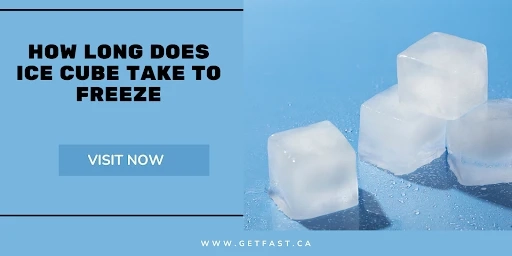Freezing ice cubes is a common kitchen task, but the time it takes for them to solidify can vary based on several factors. If you\'ve ever wondered, "how long does ice cube take to freeze?" you\'re not alone. Understanding these factors and applying some tips can help you achieve the perfect ice cubes for your needs.
What Factors Affect Ice Cube Freezing Time?
- Freezer Temperature:
- The temperature of your freezer significantly affects the freezing time. Most household freezers are set at 0°F (-18°C). At this temperature, water typically takes about 3-4 hours to freeze completely. So, if you\'re wondering how long does ice cube take to freeze, start with checking your freezer temperature.
- Water Temperature:
- The initial temperature of the water influences how long it will take to freeze. Cold water will freeze faster than warm or hot water. However, there is an interesting phenomenon known as the Mpemba effect, which we\'ll explore shortly.
- Size of Ice Cubes:
- The size of the ice cube trays also plays a role. Smaller cubes will freeze faster than larger ones due to the reduced volume of water in each compartment. This is another factor to consider when determining how long does ice cube take to freeze.
- Freezer Load:
- A fully stocked freezer may take longer to freeze ice cubes compared to a less crowded one. Proper air circulation is essential for efficient freezing. This can impact how long does ice cube take to freeze in a packed freezer.
- Material of the Ice Cube Tray:
- The material of the ice cube tray can affect freezing time. Metal trays conduct heat more efficiently than plastic ones, potentially speeding up the freezing process.
Does Hot Water Freeze Faster?
The Mpemba effect suggests that, under certain conditions, hot water can freeze faster than cold water. This counterintuitive phenomenon has been observed since ancient times and continues to intrigue scientists. Several hypotheses attempt to explain it, including:
- Evaporation: Hot water can lose mass due to evaporation, leaving less water to freeze.
- Convection Currents: Hot water can set up convection currents that might promote faster cooling.
- Dissolved Gases: Hot water may lose dissolved gases, changing its properties and freezing behavior.
However, the Mpemba effect is not guaranteed to occur every time, and results can vary based on specific conditions.
Can Water at Zero Degree Celsius Freeze Early?
Water at 0°C (32°F) is at the freezing point, but it doesn\'t always freeze instantly. For water to transition from liquid to solid, it must release latent heat. Factors like impurities in the water and the presence of nucleation sites (tiny particles that promote ice crystal formation) can influence the freezing process. Supercooled water, which remains liquid below 0°C, can freeze instantly when disturbed or when it encounters a nucleation site.
Tips to Freeze Ice Cubes Faster
- Pre-chill the Water: Start with cold water to reduce the freezing time. This can directly impact how long does ice cube take to freeze.
- Optimize Freezer Temperature: Ensure your freezer is set to the appropriate temperature for efficient freezing.
- Use Smaller Trays: Smaller compartments in the ice cube tray will freeze faster.
- Allow for Air Circulation: Avoid overcrowding your freezer to promote better air flow.
- Use Metal Trays: If you need ice cubes quickly, consider using metal trays for better heat conduction.
Conclusion
The time it takes for ice cubes to freeze depends on various factors, including freezer temperature, water temperature, the size of the ice cubes, and the material of the tray. While hot water can sometimes freeze faster than cold water due to the Mpemba effect, this phenomenon is not always predictable. Understanding these factors and implementing some simple tips can help you achieve faster and more efficient ice cube freezing in your kitchen.
By optimizing these variables, you can ensure that you always have a steady supply of ice cubes ready for your beverages and other needs. Knowing how long does ice cube take to freeze can help you better plan and prepare for any occasion.



